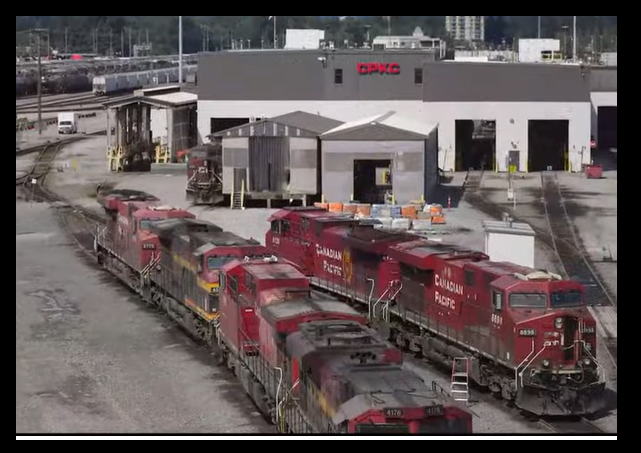Canadian Union Poised to Strike against Freight Railroads Hours after Trains Resume Service after Shutdown

While our nation has been focused on the presidential election, Canada has been dealing with strikes that threaten its freight rail service.
Earlier this week, Canada’s two major freight railroads shut their operations, locking out 9,000 members of the Teamsters union who operate the trains.
Nearly a third of the freight handled by the two railroads — Canadian National (CN) and Canadian Pacific Kansas City Southern (CPKC) — crosses the US-Canadian border, and the shutdown could disrupt operations in a number of US industries, including agriculture, autos, home building and energy, depending upon how long the shutdown lasts.“CPKC is acting to protect Canada’s supply chains, and all stakeholders, from further uncertainty and the more widespread disruption that would be created should this dispute drag out further resulting in a potential work stoppage occurring during the fall peak shipping period,” the company said in a Thursday statement shortly after the start of the lockout at 12:01 am ET. “Delaying resolution to this labor dispute will only make things worse.”This is the first time that both major Canadian railroads have shut down at the same time due to a labor dispute. The most recent work stoppage in the industry was a 60-hour strike at Canadian Pacific in 2022. Before that, there was a nine-day strike at Canadian National in 2019.Thursday’s action is different from a strike, in which union members refuse to report for work. In this case, management is the one telling the nearly 9,000 Teamsters that they can’t work.
On Friday, Canadian National (CN) reopened and workers returned. The Teamster Union said the work stoppage at Canadian Pacific Kansas City (CPKC) would continue pending an order from the Canadian Industrial Relations Board (CIRB).
The Canadian government on Thursday announced that it would ask the country’s industrial relations board to issue a back-to-work order that should come soon.The CIRB, which is independent, will now consult the companies and unions before issuing an order.CN had said it would end its lockout on Thursday at 6 p.m. ET (2200 GMT).CPKC said it was preparing to restart operations in Canada and further details on timing would be provided once it received the CIRB’s order.”I assume that the trains will be running within days,” Labour Minister Steven MacKinnon told reporters.As well as requesting a back-to-work order, MacKinnon asked the board to start a process of binding arbitration between the Teamsters union and the companies, and extend the terms of the current labor agreements until new agreements have been signed.
Now, the Teamsters have given CN a 72-hour strike notice against CN shortly after it announced that the union planned to challenge the arbitration order.
It was not clear if the latest action would bring CN trains to a halt again when the strike notice expires at 10 a.m. Monday. The whole matter might be decided before then by the Canada Industrial Relations Board, which is overseeing the arbitration.In that case, CN employees could continue working and CPKC workers could get back on the job while the union continues to challenge the legality of the arbitration order in court. All the parties had a meeting with the CIRB that began Friday morning and continued into the afternoon.Canadian National, which has about 6,500 workers involved in the dispute, said the impact of the strike notice will depend on the timing of the CIRB’s decision. “It is in the national interest of Canada that the CIRB rule quickly, before even more harm is caused,” the railroad said in a written statement. CPKC has about 3,000 engineers, conductors and dispatchers involved.Perrin Beatty, President and CEO of the Canadian Chamber of Commerce, said the union’s latest actions “will prolong the damage to our economy and jeopardize the wellbeing and livelihoods of Canadians, including union and non-union workers across multiple industries.”
There are a variety of issues related to fatigue, pay, and relocation that have not been resolved.
Contract talks between the Teamsters union and the companies usually take place a year apart, but in 2022, after the federal government introduced new rules on fatigue, CN requested a year-long extension to its existing deal rather than negotiate a new one.This meant both companies’ labor agreements expired at the end of 2023 and talks have been ongoing since.
The move created the conditions that led to both companies shutting down at the same time.
The strikes would not only be painful for Canadians, but for Americans as well.
Canada sends around 75% of all the goods it exports to the US, mostly over rail. A prolonged dispute could disrupt shipments of a wide range of goods, from grains and beans to potash, coal and timber.The lockout will also snarl commutes for tens of thousands of people in Toronto, Montreal and Vancouver, where lines rely on CPKC-owned tracks.Canada, the world’s second-largest country by area, relies heavily on rail transport.
Meanwhile, enjoy Canada’s historic first.
More on the potential impacts on the U.S. is explained in this video:
CLICK HERE FOR FULL VERSION OF THIS STORY